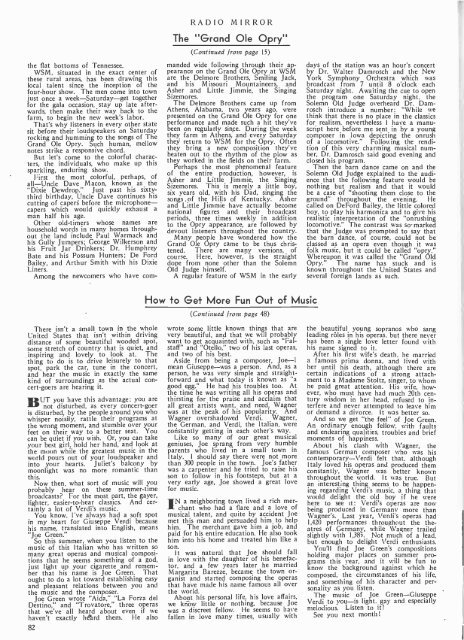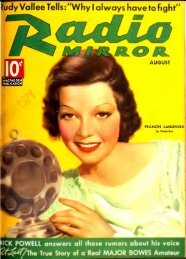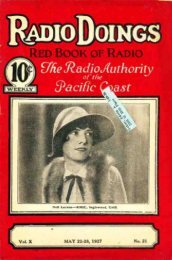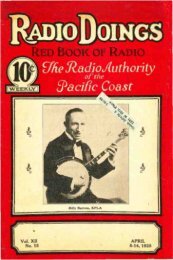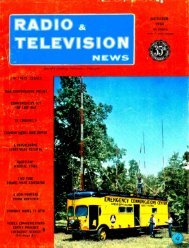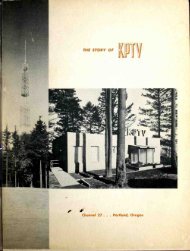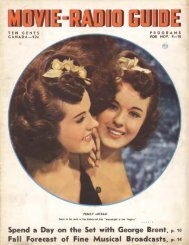Create successful ePaper yourself
Turn your PDF publications into a flip-book with our unique Google optimized e-Paper software.
the flat bottoms of Tennessee.<br />
WSM, situated in the exact center of<br />
these rural areas, has been drawing this<br />
local talent since the inception of the<br />
four -hour show. The men come into town<br />
just once a week- Saturday -get together<br />
for the gala occasion, stay up late afterwards,<br />
then make their way back to the<br />
farm, to begin the new week's labor.<br />
That's why listeners in every other state<br />
sit before their loudspeakers on Saturday<br />
rocking and humming to the songs of The<br />
Grand Ole Opry. Such human, mellow<br />
notes strike a responsive chord.<br />
But let's come to the colorful characters,<br />
the individuals, who make up this<br />
sparkling, enduring show.<br />
First the most colorful, perhaps, of<br />
all -Uncle Dave Macon, known as the<br />
"Dixie Dewdrop." Just past his sixty third birthday, Uncle Dave continues his<br />
cutting of capers before the microphone -<br />
capers which would quickly exhaust a<br />
man half his age.<br />
Other old -timers whose names are<br />
household words in many homes throughout<br />
the land include Paul Warmack and<br />
his Gully Jumpers; George Wilkerson and<br />
his Fruit Jar Drinkers; Dr. Humphrey<br />
Bate and his Possum Hunters; De Ford<br />
Bailey, and Arthur Smith with his Dixie<br />
Liners.<br />
Among the newcomers who have com-<br />
RADIO MIRROR<br />
The "Grand Ole Opry"<br />
(Continued from page 15)<br />
manded wide following through their appearance<br />
on the Grand Ole Opry at WSM<br />
are the Delmore Brothers, Smiling Jack,<br />
and his Missouri Mountaineers, and<br />
Asher and Little Jimmie, the Singing<br />
Sizemores.<br />
The Delmore Brothers came up from<br />
Athens, Alabama, two years ago, were<br />
presented on the Grand Ole Opry for one<br />
performance and made such a hit they've<br />
been on regularly singe. During the week<br />
they farm in Athens, and every Saturday<br />
they return to WSM for the Opry. Often<br />
they bring a new composition they've<br />
beaten out to the rhythm of the plow as<br />
they worked in the fields on their farm.<br />
Perhaps the most phenomenal feature<br />
of the entire production, however, is<br />
Asher and Little Jimmie, the Singing<br />
Sizemores. This is merely a little boy,<br />
six years old, with his Dad, singing the<br />
songs ,óf the Hills of Kentucky. Asher<br />
and Little Jimmie have actually become<br />
national figures and their broadcast<br />
periods, three times weekly in addition<br />
to the Opry appearance, are followed by<br />
devout listeners throughout the country.<br />
Many people have wondered how the<br />
Grand Ole Opry came to be thus christened.<br />
There are many versions, of<br />
course. Here, however, is the straight<br />
dope from none other than the Solemn<br />
Old Judge himself.<br />
A regular feature of WSM in the early<br />
days of the station was an hour's concert<br />
by Dr. Walter Damrosch and the New<br />
York Symphony Orchestra which was<br />
broadcast from 7 until 8 o'clock each<br />
Saturday night. Awaiting the cue to open<br />
the program one Saturday night. the<br />
Solemn Old Judge overheard Dr. Dam -<br />
rosch introduce a number: "While we<br />
think that there is no place in the classics<br />
for realism, nevertheless I have a manuscript<br />
here before me sent in by a young<br />
composer in Iowa depicting the onrush<br />
of a locomotive." Following the rendition<br />
of this very charming musical number,<br />
Dr. Damrosch said good evening and<br />
closed his program.<br />
Then the barn dance came on and the<br />
Solemn Old Judge explained to the audience<br />
that the following feature would be<br />
nothing but realism and that it would<br />
be a case of "shooting them close to the<br />
ground" throughout the evening. He<br />
called on DeFord Bailey, the little colored<br />
boy, to play his harmonica and to give his<br />
realistic interpretation of the "onrushing<br />
locomotive." The contrast was so-marked<br />
that the Judge was prompted to say that<br />
the barn dance, of course, could not be<br />
classed as an opera even though it was<br />
folk music, but it could be called "opry."<br />
Whereupon it was called the "Grand Old<br />
Opry." The name has stuck and is<br />
known throughout the United States and<br />
several foreign lands as such.<br />
How to Get More Fun Out of Music<br />
(Continued from page 48)<br />
There isn't a small town in the whole<br />
United States that isn't within driving<br />
distance of some beautiful wooded spot,<br />
some stretch of country that is quiet, and<br />
inspiring and lovely to look at. The<br />
thing to do is to drive leisurely to that<br />
spot, park the car, tune in the concert,<br />
and hear the music in exactly the same<br />
kind of surroundings as the actual concert<br />
-goers are hearing it.<br />
BUT<br />
you have this advantage: you are<br />
not disturbed, as every concert -goer<br />
is disturbed, by the people around you who<br />
whisper noisily, rattle their programs at<br />
the wrong moment, and stumble over your<br />
feet on their way to a better seat. You<br />
can be quiet if you wish. Or, you can take<br />
your best girl, hold her hand, and look at<br />
the moon while the greatest music in the<br />
world pours out of your loudspeaker and<br />
into your hearts. Juliet's balcony by<br />
moonlight was no more romantic than<br />
this.<br />
Now then, what sort of music will you<br />
probably hear on these summer -time<br />
broadcasts? For the most part, the gayer,<br />
lighter, easier -to-hear classics. And certainly<br />
a lot of Verdi's music.<br />
You know, I've always had a soft spot<br />
in my heart for Giuseppe Verdi because<br />
his name, translated into English, means<br />
"Joe Green."<br />
So this summer, when you listen to the<br />
music of this Italian who has written so<br />
many great operas and musical compositions<br />
that he seems something of a god,<br />
¡lust light up your cigarette and remember<br />
that his name is Joe Green. That<br />
ought to do a lot toward establishing easy<br />
and pleasant relations between you and<br />
the music and the composer.<br />
Joe Green wrote "Aida," "La Forza del<br />
Destino," and "Trovatore," three operas<br />
that we've all heard about even if we<br />
haven't exactly hard them. He also<br />
82<br />
wrote some little known things that are<br />
very beautiful, and that we will probably<br />
want to get acquainted with, such as "Falstaff"<br />
and "Otello," two of his last operas,<br />
and two of his best.<br />
Aside from being a composer, Joe-1<br />
mean Giuseppe -was a person. And, as a<br />
person, he was very simple and straightforward<br />
and what today is known as "a<br />
good egg." He had his troubles too. At<br />
the time he was writing all his operas and<br />
thirsting for the praise and acclaim that<br />
all great artists want, and need, Wagner<br />
was at the peak of his popularity. And<br />
Wagner overshadowed Verdi. Wagner,<br />
the German, and Verdi, the Italian, were<br />
constantly getting in each other's way.<br />
Like so many of our great musical<br />
geniuses, Joe sprang from very humble<br />
parents who lived in a small town in<br />
Italy. I should say there were not more<br />
than 300 people in the town. Joe's father<br />
was a carpenter and he tried to raise his<br />
son to follow in his footsteps, but at a<br />
very early age, Joe showed a great love<br />
for music.<br />
IN a neighboring town lived a rich merchant<br />
who had a flare and a love of<br />
musical talent, and quite by accident Joe<br />
met this man and persuaded him to help<br />
him. The merchant gave him a job, and<br />
paid for his entire education. He also took<br />
him into his home and treated him like a<br />
son.<br />
It was natural that Joe should fall<br />
in love with the daughter of his benefactor,<br />
and a few years later he married<br />
Margarita Barezze, became the town organist<br />
and started composing the operas<br />
that have made his name famous all over<br />
the world.<br />
About his personal life, his love affairs,<br />
we know little or nothing, because Joe<br />
was a discreet fellow. He seems to have<br />
fallen in love many times, usually with<br />
the beautiful young sopranos who sang<br />
leading rôles in his operas. but there never<br />
has been a single love letter found with<br />
his name signed to it.<br />
After his first wife's death, he married<br />
a famous prima donna, and lived with<br />
her until his death, although there are<br />
certain indications of a strong attachment<br />
to a Madame Stoltz, singer, to whom<br />
he paid great attention. His wife, however,<br />
who must have had much 20th century<br />
wisdom in her head, refused to interfere<br />
and never attempted to leave him<br />
or demand a divorce. It was better so.<br />
And so we get "the feel" of Joe Green.<br />
An ordinary enough fellow. with faults<br />
and endearing qualities, troubles and brief<br />
moments of happiness.<br />
About his clash with Wagner, the<br />
famous German composer who was<br />
his<br />
contemporary -Verdi felt that, although<br />
Italy loved his operas and produced them<br />
constantly, Wagner was better known<br />
throughout the world. It was true. But<br />
an interesting thing seems to be happening<br />
regarding Verdi's music, a thing that<br />
would delight the old boy if he were<br />
here to see it: Verdi's operas are now<br />
being produced in Germany more than<br />
Wagner's. Last year, Verdi's operas had<br />
1,420 performances throughout the theatres<br />
of Germany, while Wagner trailed<br />
slightly with 1,335. Not much of a lead,<br />
but enough to delight Verdi enthusiasts.<br />
You'll find Joe Green's compositions<br />
holding major places on summer programs<br />
this year, and it will be fun to<br />
know the background against which .he<br />
composed, the circumstances of his life,<br />
and something of his character and personality<br />
as you listen.<br />
The music of Joe Green -Giuseppe<br />
Verdi to you -is light. gay and especially<br />
melodious. Listen to it!<br />
See you next month!


